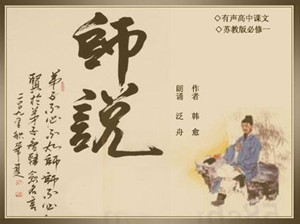(单词翻译:单击)

小编导读:《师说》是唐朝著名文学家韩愈的名作,这篇文章是韩愈写给他的学生李蟠的。《师说》是一篇说明教师的重要作用、从师学习的必要性以及择师的原则的论说文。此文抨击当时“士大夫之族”耻于从师的错误观念,倡导从师而学的风气,同时,也是对那些诽谤者的一个公开答复和严正的驳斥。作者表明任何人都可以作自己的老师,不应因地位贵贱或年龄差别,就不肯虚心学习。文末以孔子言行作证,申明求师重道是自古已然的做法,时人实不应背弃古道。
韩愈 《师说》
古之学者必有师。师者,所以传道受业解惑也。人非生而知之者,孰能无惑?惑而不从师,其为惑也,终不解矣。生乎吾前,其闻道也,固先乎吾,吾从而师之;生乎吾后,其闻道也,亦先乎吾,吾从而师之。吾师道也,夫庸知其年之先后生于吾乎?是故无贵无贱,无长无少,道之所存,师之所存也。
嗟乎!师 道之不传也久矣,欲人之无惑也难矣。古之圣人,其出人也远矣,犹且从师而问焉;今之众人,其下圣人也亦远矣,而耻学于师。是故圣益圣,愚益愚。圣人之所以为圣,愚人之所以为愚,其皆出于此乎?爱其子,择师而教之;于其身也,则耻师焉,惑矣。彼童子之师,授之书而习其句读者,非吾所谓传其道、解其惑者也。句 读之不知,惑之不解,或师焉,或不焉,小学而大遗,吾未见其明也。巫医、乐师、百工之人,不耻相师。士大夫之族,曰“师”曰“弟子”云者,则群聚而笑之。 问之,则曰:彼与彼年相若也,道相似也, 位卑则足羞,官盛则近谀。呜呼!师道之不复,可知矣。 巫医、乐师、百工之人,君子不齿,今其智乃反不能及,其 可怪也欤!
圣人无常师。孔子师郯子、苌弘、师襄、老聃。郯子之徒,其贤不及孔子。孔子曰“三人行,则必有我师。”是故弟子不必不如师,师不必贤于弟子。闻道有先后,术业有专攻,如是而已。
李氏子蟠,年十七,好古文,六艺经传皆通习之,不拘于时,学于余。余嘉其能行古道,作《师说》以贻之。
On Teachers
Hah Yu
Ancient scholars certainly had teachers. A teacher is one whopasses on the truth, imparts knowledge and solves puzzles. Man is not born withknowledge. Who can deny that he has puzzles? These would remain unsolved,should one refuse to be instructed by teachers.
The men born before me surely know the truth before me, so Irespect them as teachers, whereas those born after me may also know the truthbefore me, I likewise respect them as teachers. It is the truth that Iendeavour to learn. Must I know beforehand whether my teacher was born earlieror later than I? Therefore, no distinction should be made between the noble andthe humble or between the young and the old. Where lies the truth, there is ateacher.
Alas, it is a long time since the admirable tone ofrespecting teachers ceased to pass on! How hard it would be to expect a man tobe free of puzzle! Sages in olden times outstripped by far the ordinary people.Nevertheless, they had teachers and asked them questions. Nowadays themultitude, though much inferior to sages, are ashamed of being instructed byteachers. As a consequence, sages become more sage, and ignoramuses moreignorant. The wisdom of the former and the stupidity of the latter — are theynot all caused by this?
Loving parents may select teachers to instruct theirchildren. But when it comes to themselves, they feel it a disgrace to be taughtby them. How wrong they must be! The teachers of their children only show themhow to read a book sentence by sentence, not to be mentioned in the same breathas those whom I refer to as passing on the truth and solving puzzles. For lackof reading skills, one seeks the help of teachers, while for unsolved puzzles,one acts contrariwise. It is indeed learning the lesser but giving up thegreater. I do not see its wisdom.
Physicians, musicians and multifarious artisans are notashamed of learning from each other. But among the gentlefolk the talk aboutthe teachers and pupils would invite laughter from a gathered company. Whenasked about the reason, they would say, "The one is equal to the other inage and knowledge." To be instructed by a man of low social standing isregarded as a disgrace, and by a man of high official rank as a flattery. Alas,it is only conceivable that the noble tone of respecting teachers is lost andhardly retrievable! Physicians, musicians and artisans are refused to betreated as equals by gentlefolks, yet these turn out to be less intelligentthan those. Is it not strange?
Sages have had no constant teachers. Confucius once learnedfrom Tan Zi as well as from Chang Hong, Shi Xiang and Laozi, though Tan Zi andhis like are not on a parity with him in wisdom. Confucius says: "Out ofmy two fellow-travellers one must be qualified to be my teacher." Hencepupils are not necessarily inferior to teachers, and teachers need not alwaysbe superior to pupils. Some may know the truth earlier or later than others andeach has his own professional specialty — that is all!
Li Pan, aged seventeen, is fond of ancient classical writingsand have studied all the six arts and their commentaries. Not restrained by thecurrent practice, he has learned from me. As I commend him for his being ableto follow the old ways, I am writing this essay "On Teachers" forhim.
更多精品翻译素材,敬请关注可可英语。


